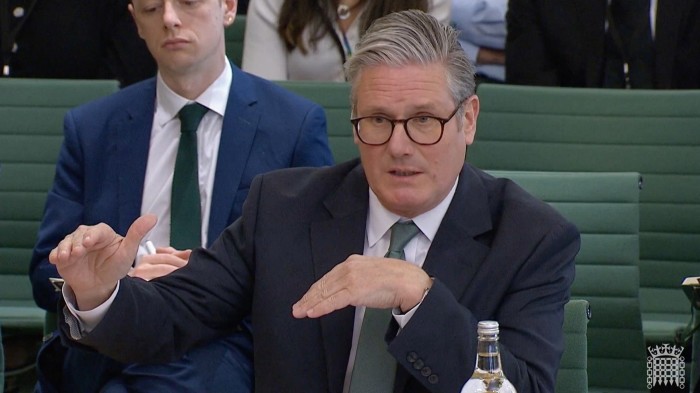Unlock the Editor’s Digest for free
Roula Khalaf, Editor of the FT, selects her favourite stories in this weekly newsletter.
Sir Keir Starmer has taken a swipe at the independent Office for Budget Responsibility, criticising the UK fiscal watchdog’s decision not to “score” the job creation impact of the government’s welfare reforms.
The intervention by the prime minister is highly unusual given that his administration has been keen to underpin the OBR to bolster its own fiscal credibility. One of its first legislative acts was to strengthen the body’s powers.
But Starmer was frustrated with the OBR’s cautious impact assessments in the run-up to chancellor Rachel Reeves’ Spring Statement, as the government seeks to prove its changes to the benefits system will help push more people into work.
Speaking to senior MPs on Tuesday, Starmer said: “On the impact assessments it’s significant to my mind that the ability of any policy or legislation to change any behaviour at all is not priced in.”
He said welfare reforms, including giving people the “right to try” work, would lead to more Britons moving off benefits and into employment, saving the taxpayer money and boosting economic growth.
“The OBR has scored nothing against any change here,” he said. “The assumption is not a single person changes their behaviour. I personally struggle with that way of looking at it. I do think these changes will make a material difference and they need to make a material difference.”
The comments will be seen as a warning shot across the OBR’s bows and reflect wider frustration in Downing Street. However, one aide to Starmer said: “We aren’t planning to change the OBR.”
Liz Truss, then Conservative prime minister, sidelined the watchdog ahead of her ill-fated “mini-Budget” in September 2022, and Labour quickly legislated after last year’s election to make sure that did not happen again.
The OBR said in its March outlook that it was not recording any positive impact from the government’s Pathways to Work green paper in its forecast because of “insufficient information”.
The watchdog recorded a small negative impact from Labour’s decision to reverse reforms to the work capability assessment that had been announced by the previous Tory government in autumn 2023. This decision meant a reduction of 8,000 in the labour supply.
But the OBR said in its March outlook the government had not provided a “comprehensive and robust” analysis of the effects of its own reforms, adding: “We were not, in the very limited time available, able to develop our own analysis of their net impact on labour supply.”
The OBR said it would work with both the Treasury and the Department for Work and Pensions to scrutinise the direct and indirect effects of the welfare and employment support policies ahead of the next forecast, which is due in the autumn.
Asked about Starmer’s comments, the watchdog said it had no comment beyond what it had put in its March fiscal outlook.
Former Tory chancellor Jeremy Hunt said: “Having made a great play of criticising Conservative battles with the OBR, it is frankly a bit rich for Keir Starmer to be complaining when the Treasury failed to get the information to them by the agreed deadlines.”
The OBR has been under pressure to give the government more credit for pro-growth reforms as Reeves puts growth at the heart of the government’s mission.
The watchdog did give ministers credit for their planning reforms, saying they would lead to a near-term boost to demand, coupled with a medium-term increase in the supply capacity of the economy, reaching 0.2 per cent of GDP in 2029-30.




